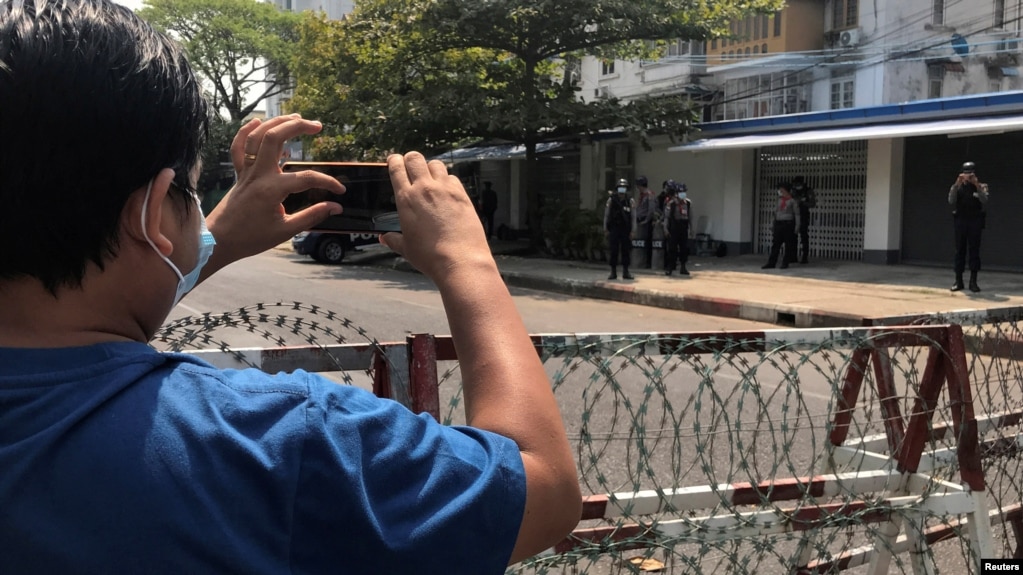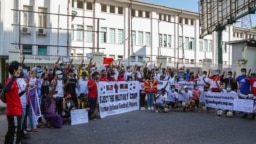Citizen Journalists Fight Back Against Myanmar Military's Crackdown
Tommy Walker
February 15, 2022

February 15, 2022

A journalist and a police officer take pictures of each other as people protest against the military coup in Yangon, Myanmar, Feb. 23, 2021.
BANGKOK —
Professional reporters in Myanmar say their job is nearly impossible under the fierce restrictions imposed by military rule. Now, citizen journalists have stepped into the breach, often working undercover to avoid arrests or worse.
After a coup ousted elected civilian leaders about a year ago, press freedom in the country rapidly declined. The junta banned several news outlets; hundreds of reporters have been detained and several killed.
The country's crisis, however, has only inspired converts like 27-year-old Shane, an engineer who lost his job in the post-coup economic turmoil.
Shane joined anti-junta protests with the civil disobedience movement, or CDM, which initially organized street demonstrations featuring Myanmar's professional class — doctors, lawyers, teachers — and then launched successive strikes.
BANGKOK —
Professional reporters in Myanmar say their job is nearly impossible under the fierce restrictions imposed by military rule. Now, citizen journalists have stepped into the breach, often working undercover to avoid arrests or worse.
After a coup ousted elected civilian leaders about a year ago, press freedom in the country rapidly declined. The junta banned several news outlets; hundreds of reporters have been detained and several killed.
The country's crisis, however, has only inspired converts like 27-year-old Shane, an engineer who lost his job in the post-coup economic turmoil.
Shane joined anti-junta protests with the civil disobedience movement, or CDM, which initially organized street demonstrations featuring Myanmar's professional class — doctors, lawyers, teachers — and then launched successive strikes.

Myanmar Military Targets Sector Professionals as Demonstrations Continue
The experience transformed him.
"My passion is more relevant to the journalist job. That's why I joined the CDM, (and) it can be said that I (then) became a citizen journalist," Shane told VOA. (To help ensure safety, VOA is not using the full name of any citizen journalist in this story.)
After the strikes, Myanmar's military rulers forced those who had been living in government housing to leave, including Shane.
"I returned to my native town, Mindat, Chin state, and a few months later, the battles started," he said.
In May, Shane reported on some of the military's most violent episodes, including conflict with the Chin Defense Forces, formed after the coup to guard townships and civilians from military attacks in Chin state.
"The worst thing I have had to report is around 10 young men were killed in one day in the battle of Mindat," he said.

Displaced people from Mindat take shelter in a forest in western Myanmar's Chin state, amid ongoing attacks by the military following clashes with the Chin Defence Forces militia group, in May 2021.
(Handout photo by Chin World / AFP)
Shane said he watched the military burn two men to death. He reported that junta forces arrested several civilians, ordered them to wear military uniforms and used them as human shields, causing a Chin forces retreat.
At the time, Shane was assisting reporters from local, national and international media outlets.
"We don't get income by doing citizen journalism, but with passion and enthusiasm, with the mindset that we will contribute our best for our people and our region, and we are still working on it," he said.
Dozens detained
There is no telling how many citizen journalists are taking up the pen in Myanmar. The void they are filling, however, is big and getting bigger.
According to Reporting ASEAN, a monitoring group in Southeast Asia, 121 journalists have been arrested in Myanmar as of Feb. 9, 2022. Of those, 47 remain in custody, 16 were convicted of various charges and one died.
According to the United Nations spokesperson, Stephane Dujarric, the number of journalists arrested in the past 12 months is higher: 146, including 12 women.

Shane said he watched the military burn two men to death. He reported that junta forces arrested several civilians, ordered them to wear military uniforms and used them as human shields, causing a Chin forces retreat.
At the time, Shane was assisting reporters from local, national and international media outlets.
"We don't get income by doing citizen journalism, but with passion and enthusiasm, with the mindset that we will contribute our best for our people and our region, and we are still working on it," he said.
Dozens detained
There is no telling how many citizen journalists are taking up the pen in Myanmar. The void they are filling, however, is big and getting bigger.
According to Reporting ASEAN, a monitoring group in Southeast Asia, 121 journalists have been arrested in Myanmar as of Feb. 9, 2022. Of those, 47 remain in custody, 16 were convicted of various charges and one died.
According to the United Nations spokesperson, Stephane Dujarric, the number of journalists arrested in the past 12 months is higher: 146, including 12 women.

Police arrest a journalist in Yangon on Feb. 27, 2021, as protesters were taking part in a demonstration against the military coup.
And a Facebook group, Detained Journalists Information Myanmar, counts 23 citizen journalists, freelancers or former journalists detained and one killed.
"The (junta) targets not only working journalists, but they want everyone who has contact with media organizations," said Thiri, a former journalist and administrator for the Facebook page.
Myanmar's military spokesperson has said that only those inciting unrest have been arrested.
The coup took place on Feb. 1, 2021, when General Min Aung Hlaing overthrew the elected government of Nobel prize winner Aung San Suu Kyi.
She is now in prison on what rights groups say are fabricated corruption charges.
According to the Assistance Association for Political Prisoners, at least 1,546 people have been killed by the military since the coup.
'Gun to my chest'
May, a 26-year-old also from Chin state, has found herself in precarious situations while reporting. She became a citizen journalist before the coup, in 2018, and told VOA that her curious personality had drawn her to the profession.
"I wanted to know something first, so I always go and investigate what happened and share with others," she said. "The life is really different from other ordinary life. It keeps me awake, conscious, alert and active every day."
In April, she witnessed junta forces open fire on civilians in Kanpetlet, a town in Chin state. Despite the dangers, May tried to get closer to the events to gather more information. Soldiers said no.
"The junta forces pointed a gun to my chest and said, 'If you take a step, you will be shot.'"
"I was so weak in my mind, I wanted to cry. I was so angry at him (the soldier). I just stared at him," May said. Fortunately for May, one of the soldier's superiors prevented her from being shot.
It wasn't her first intimidating encounter with the military.
"My phone is often checked by junta forces," she said. "They found some wounded people's photos, and victims' photos and asked me why these photos are on my phone. They questioned me again and again for long hours."
May has no plans to stop. "While there is still growing military pressure, I will continue to do citizen journalism," she said. "It is still going on."
'Whole country' news
Veteran journalist Aye Chan Naing, editor of Democratic Voice of Burma, an independent broadcast media group in Myanmar, has said there is "zero tolerance" for independent media in Myanmar. What's happened in reaction, though, is that "the whole country has become a journalist," Aye Chan Naing said.
"If you really want to work in the media environment in Burma, you really have to be undercover. They (the military) consider everyone an enemy," he told VOA. Burma is the former name for Myanmar.
And a Facebook group, Detained Journalists Information Myanmar, counts 23 citizen journalists, freelancers or former journalists detained and one killed.
"The (junta) targets not only working journalists, but they want everyone who has contact with media organizations," said Thiri, a former journalist and administrator for the Facebook page.
Myanmar's military spokesperson has said that only those inciting unrest have been arrested.
The coup took place on Feb. 1, 2021, when General Min Aung Hlaing overthrew the elected government of Nobel prize winner Aung San Suu Kyi.
She is now in prison on what rights groups say are fabricated corruption charges.
According to the Assistance Association for Political Prisoners, at least 1,546 people have been killed by the military since the coup.
'Gun to my chest'
May, a 26-year-old also from Chin state, has found herself in precarious situations while reporting. She became a citizen journalist before the coup, in 2018, and told VOA that her curious personality had drawn her to the profession.
"I wanted to know something first, so I always go and investigate what happened and share with others," she said. "The life is really different from other ordinary life. It keeps me awake, conscious, alert and active every day."
In April, she witnessed junta forces open fire on civilians in Kanpetlet, a town in Chin state. Despite the dangers, May tried to get closer to the events to gather more information. Soldiers said no.
"The junta forces pointed a gun to my chest and said, 'If you take a step, you will be shot.'"
"I was so weak in my mind, I wanted to cry. I was so angry at him (the soldier). I just stared at him," May said. Fortunately for May, one of the soldier's superiors prevented her from being shot.
It wasn't her first intimidating encounter with the military.
"My phone is often checked by junta forces," she said. "They found some wounded people's photos, and victims' photos and asked me why these photos are on my phone. They questioned me again and again for long hours."
May has no plans to stop. "While there is still growing military pressure, I will continue to do citizen journalism," she said. "It is still going on."
'Whole country' news
Veteran journalist Aye Chan Naing, editor of Democratic Voice of Burma, an independent broadcast media group in Myanmar, has said there is "zero tolerance" for independent media in Myanmar. What's happened in reaction, though, is that "the whole country has become a journalist," Aye Chan Naing said.
"If you really want to work in the media environment in Burma, you really have to be undercover. They (the military) consider everyone an enemy," he told VOA. Burma is the former name for Myanmar.

'Zero Tolerance' For Myanmar's Free Press
A reporter who writes under the name Aung Htun at Burma VJ, a media network of journalists, said colleagues were taking more precautions.
Reporters are using Signal, a secure text messaging app. But with regular internet shutdowns by the junta, it's tough sometimes to get the news out.
With no internet to broadcast on, Shane said he shares his reporting by making phone calls.
"I believe it is my responsibility to write news and broadcast through radio," Shane said. "It is very important for my people, because there is no internet connection since September 2021."
No comments:
Post a Comment